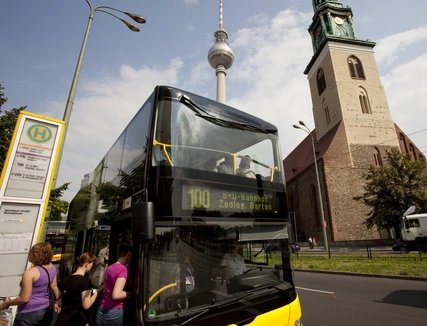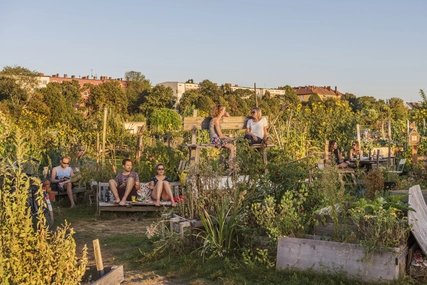
Tips for a sustainable class trip
How to show your class sustainability in Berlin
Berlin is a popular destination for class trips – and there are many reasons for this: Sightseeing, excursions, the history of the city and the political events that have happened in the capital. Students will certainly also be attracted by Berlin’s reputation as being a cool, international city. All these things mean that Berlin is exciting for all class levels and ages.
The city of Berlin is committed to sustainability – its goal is to be climate-neutral by 2050. That’s why we are providing you with the following tips on how you and your students can make your class trip sustainable together. Because we believe that travel is important, inspiring and connects people.
What does sustainable travel actually mean?
Sustainable travel fulfils the wishes of visitors and at the same time ensures stable economic development for the city and the people living there.
However, it is also important to treat natural resources and the environment with care and to treat residents with respect.
What is the added value in sustainable class trips to Berlin?
Class trips are without question valuable on an educational level. They complement school instruction, engaging with individual lesson topics. If you wish to focus on sustainability, you can show your class new perspectives and raise their awareness on the topic of sustainability – be it while eating, shopping or travelling.
How to plan your sustainable class trip to Berlin
At least six months before departure: preparation
The success of every trip lies in good preparation and planning. It is best to work on it together with parents and the class. This will enable you all to become enthusiastic about the topic of sustainability at an early stage. It is also worth bringing up this topic in class.
- We have also compiled some tips for you for preparing a class trip
- If you want to delve even deeper into the subject of sustainable travel, you will find valuable tips on the Federal Environment Agency’s website.
We recommend that you consider the following points when preparing your class trip:
- Organise a parents’ evening on the topic of sustainable class trips.
- Actively involve pupils in the planning process.
- Let the class research the topic of sustainability. What does Berlin have to offer?
- Plan sustainably – especially regarding how to travel around the city, accommodation, meals and local activities.
- Find out about Berlin’s culture and special characteristics.
At least six months before departure: accommodation

Hostels or youth hostels are particularly suitable for class trips. When choosing accommodation and meals you can pay special attention to sustainability. Look for places that are mindful of their energy footprint and use organic, regional or fair trade products. Environmental labels and other seals of approval can help you when deciding.
Pay attention to the following aspects when looking for sustainable accommodation:
- Awards given by environmental labels
- Energy generation through renewable energies or/and climate neutrality of the accommodation
- Fair payment of employees
- Use of regional and fair trade organic foods
- Convenient public transport connections
At least three months before departure: arrival and departure

There are many sustainable alternatives when it comes to choosing how you travel to and from Berlin. Compare the prices of bus and train journey providers early on, and also look at Deutsche Bahn’s cheaper group tickets. You can talk to your students about this in class and compare different means of transport and their carbon emissions. There are web-based carbon dioxide calculators to help you do this (e.g. natuerlich-fairreisen.de). Discuss carbon offsetting programmes as well.
Our tips for selecting your means of transport to and from Berlin:
- Use more environmentally-friendly means of transport such as buses or trains.
- Discuss the issue of carbon dioxide emissions and their impact on the environment and society with your class.
- Use carbon offsetting providers for the journey (e.g. atmosfair).
At least two months before departure: local transport

Berlin can easily be explored on foot, by bike or by public transport in an environmentally-friendly way. Research the group fares for public transport in Berlin. Our tip: With the Berlin WelcomeCard you will have free travel on all public transport and receive discounts of up to 50% from numerous partners.
Fancy a ride? Check out the range of hire bikes for large groups in good time. We have put together a number of suggested cycling routes through Berlin for you.
And a few more tips:
- Encourage human-powered movement, such as walking, cycling and boating.
- Research bike hire providers in advance (your accommodation may also have bikes for hire).
- Be safety conscious and stay aware of traffic when cycling – we have put together 15 tips for cycling in Berlin
- Use public transport (tram, local train, underground, bus).
- Plan programme activities on the subject of mobility in large cities; you will find inspiration at Smart City.
At least two months before departure: local activities

Berlin offers you and your class numerous exciting attractions and activities, ensuring that you will all have fond memories of the trip. Berlin is a creative and green capital and offers numerous sustainable leisure activities.
Our tips for selecting activities:
Our tips for selecting activities:
- Make the topic of sustainability a tangible experience and plan suitable activities, such as the “Wald. Berlin. Climate.” exhibition in the forest or visit one of the many community gardens.
- When deciding, give preferential treatment to leisure activities that conserve resources.
- Support local producers (of crafts, fashion, food delicacies).
- Observe the rules for being quiet at night in Berlin’s neighbourhoods and also dispose of rubbish in the bins provided.
- Please also inform yourselves about staying safe in our city.
At least one month before departure: meals

It is also worth paying attention to sustainability when it comes to your food choices. Find restaurants that use organic, regional or fair trade ingredients.
Note the following points when selecting places to eat:
- Eat vegetarian food as often as possible, because meat consumption would negatively impact your class trip’s climate footprint. You will find numerous vegetarian and sustainable restaurants in Berlin.
- When deciding, give preferential treatment to healthy, regional and seasonal food.
- Look out for fair trade products.
- Let the teenagers prepare delicious and healthy lunch packages themselves.
- Avoid wasting food.
- Avoid making rubbish by using reusable lunch boxes and water bottles.
No later than one month after the return journey: follow-up and evaluation
We recommend discussing the experiences gathered on the trip to Berlin afterwards in class. School exhibitions, blogs or presentations are suitable for a sustainable class trip.
Our tips for the evaluation:
- Talk to your class about critical issues such as waste and noise pollution or the resources wasted as a result of tourism.
- Evaluate the goals set before the class trip.
The non-profit association EPIZ Berlin offers you even more information on sustainable class trips.
